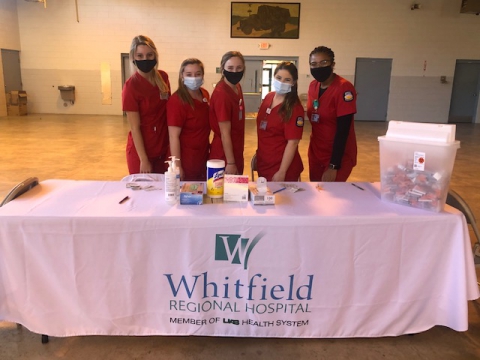Nurses continue education online to earn bachelor’s degree, leadership roles, higher wages

For the first time since the University of West Alabama’s nursing education program was established in 1974, a cohort of nurses are on their way to earning a bachelor’s degree in nursing from UWA. By adding this offering in addition to the associate’s degree, UWA is helping address the shortage of qualified nursing leaders through the launch of this program, which is offered online.
Individuals who earn an associate’s degree in nursing from UWA typically go on to pursue national licensure and, upon completion, become registered nurses (RN). The new RN to BSN (Bachelor of Science in nursing) program further equips nurses with the knowledge, skills and abilities necessary to offer more comprehensive healthcare.
“There is a core curriculum that RNs will have followed to understand anatomy, physiology, psychology, basic biology—the ways the healthy human body functions,” explained Dr. Mary Hanks, chair of UWA’s Ira D. Pruitt Division of Nursing. “Additionally, they learn about pathophysiology, or disease processes, as well as actions we can take to promote, improve, or rehabilitate health. The BSN takes them several steps further.”
The continuation of the curriculum to the BSN adds other critical skills that help nurses adapt to systems that exist within the nursing profession.
“Critical thinking and reading comprehension are imperative for nurses,” Hanks said. “Understanding and accuracy are critical, as miscomprehension could potentially compromise the health of a patient, whether it’s doctor’s orders, patient history, symptoms, even workplace communications.”
Advanced degrees in nursing help both the profession and practitioners.
“For healthcare, it means we have the opportunity to see more advancements with insight and expertise from nurses. For nurses, it can bring additional career opportunities and significantly higher wages,” Hanks explained.
To help alleviate the costs of education for future nurses, UWA’s Project EARN—Educating Alabama Rural Nurses—provides scholarships for up to 35 qualifying nursing students each semester, with $4,000 awarded up to four semesters. The program is funded by a $2.4 million grant from Health Resources & Services Administration (HRSA) to help address a shortage of qualified nurses. Currently, Project EARN is awarded to students entering the ASN program.
The coronavirus pandemic has placed a microscope on healthcare, highlighting both critical care and daily living.
“RN to BSN gives nurses opportunities to explore healthcare more thoroughly in a way that will allow them to address a more broad range of needs—not just the immediate needs of individual patients, but the critical needs of their communities as a whole. They can study disparities and inequities, as well as the opportunities and resources to help resolve those,” Hanks said.
Hanks, who transitioned to healthcare education in 2011 after 17 years in the clinical setting, is currently assisting with the administration of the COVID-19 vaccine in one of the region’s most populated hospitals. Because she leads by example, a team of UWA student nurses are assisting in a COVID-19 vaccination clinic in Marengo county.
“Nurses play a critical role in our society, no matter where they are,” Hanks said. “There is a component of nursing that cannot be taught, a compassion for helping people through some of their lives’ greatest struggles. To do this, we must acknowledge the risks and know how to provide care safely. We want to equip our nurses to be leaders, and that’s what RN to BSN will do.”
To learn more about UWA’s RN to BSN program and scholarship opportunities available, visit UWA Nursing at uwa.edu/academics/divisionofnursing.